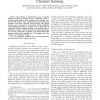Free Online Productivity Tools
i2Speak
i2Symbol
i2OCR
iTex2Img
iWeb2Print
iWeb2Shot
i2Type
iPdf2Split
iPdf2Merge
i2Bopomofo
i2Arabic
i2Style
i2Image
i2PDF
iLatex2Rtf
Sci2ools
109
click to vote
TSP
2008
2008
Opportunistic Spectrum Access via Periodic Channel Sensing
The problem of opportunistic access of parallel channels occupied by primary users is considered. Under a continuous-time Markov chain modeling of the channel occupancy by the primary users, a slotted transmission protocol for secondary users using a periodic sensing strategy with optimal dynamic access is proposed. To maximize channel utilization while limiting interference to primary users, a framework of constrained Markov decision processes is presented, and the optimal access policy is derived via a linear program. Simulations are used for performance evaluation. It is demonstrated that periodic sensing yields negligible loss of throughput when the constraint on interference is tight.
Related Content
| Added | 15 Dec 2010 |
| Updated | 15 Dec 2010 |
| Type | Journal |
| Year | 2008 |
| Where | TSP |
| Authors | Qing Zhao, Stefan Geirhofer, Lang Tong, Brian M. Sadler |
Comments (0)

